Batting collapses – they are not the easiest things to watch, whether you’re out in the middle or sitting in the stands. This is especially true if it’s your favourite team that’s caught up in this unfortunate predicament. While there have been instances where men have dug their sides out of this gaping hole, resulting in thrilling finishes, the majority of cricketing folklore is littered with stories that talk of some of the most humiliating defeats teams have suffered due to such calamities.The term itself is used to describe an event of many batsmen getting out in rapid succession, while only a few runs are scored. Regardless of the format, cricket has witnessed such historical occurrences quite a few times. Although the emergence of Twenty20 cricket has offset such falls to an extent, one still gets goosebumps when any such thing occurs either during a chase or at the beginning of an innings. These often give bowlers hope, given the fact that the recent rule changes have loaded the dice heavily in favour of the willow-wielders. Parity is thus restored to make it an even contest.The World Cup, too, has seen such instances. Here are five of the worst ever falls in the tournament’s forty-year history:
#1 Australia v West Indies, Semi Final 2, 1996 World Cup
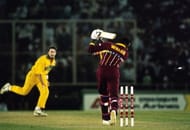
The second semi-final was, in essence, a tale of two collapses. The difference, however, remained in the approaches of the opposing teams. While Mark Taylor’s Australians refused to throw in the towel and kept going till the very end, Richie Richardson’s men panicked, to put it simply. It was eerily similar to the first semi-final, which ended one of the host nations’ hopes.
Mohali’s tricky pitch saw the experienced Curtly Ambrose, along with Ian Bishop, take out the first four Australian wickets with less than twenty on the board. However, Stuart Law and Michael Bevan batted with grim determination, and some quick hitting from the lower order pushed the final total to 207. It wasn’t considered to be a winning total by most experts, especially in light of the fact that the PCA stadium heavily favoured the side batting second. Shivnarine Chanderpaul and Brian Lara’s alliance, followed by Richardson’s calm batting down the order, were all ominous signs for the Kangaroos.
But Taylor, who hadn’t given up yet, brought Glenn McGrath back into the attack, and the lanky seamer prised out Chanderpaul (Lara having fallen to Steve Waugh earlier). This triggered the floodgates – big hitters Roger Harper and Ottis Gibson were dispatched back to the hut in quick succession, followed by the rest of the batsmen. Richardson continued to wage a lone battle, but against the wiles of Shane Warne and Damien Fleming, the tail was just slaughtered – enabling Australia to run out winners by a mere seven runs and gain a place in the final.
#2 Pakistan vs England, Group Stage, 1992 World Cup
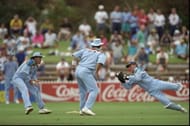
The weather gods love to play spoilsport, especially when they contribute to one team’s low score. To even things out, they then unleash their fury in the form of heavy showers, and sometimes a bit of lightning, nullifying the opposition’s advantage. That’s exactly what unfolded at the Adelaide Oval on March 1, 1992 – it was the 13th game of the tournament, in addition, an ominous sign in itself.
Put into bat by England skipper Graham Gooch, Pakistan’s top order crumbled against a fine exhibition of swing and seam by Derek Pringle and Phil DeFreitas. In no time, they were reduced to 32/5, and only Saleem Malik seemed capable of handling the conditions as well as put up any semblance of a fight. Ian Botham, Dermot Reeve and Gladstone Small also joined the party with their colleagues, bowling with venom, as Pakistan’s lower order came out a little too early for their liking – eventually folding for 74, their lowest ever score in One-Day Internationals. Talismanic skipper Imran Khan’s absence was sorely felt, according to most of the Pakistan supporters.
Wasim Akram, who would later play a central role in his side’s triumph at the summit clash against the same opponents, dismissed Gooch early in the chase, but further spells of rain caused the game to be reduced to 16 overs, with the target set to 64. However, a total of three hours were lost to the inclement weather, and eventually the game was abandoned with England eight overs into their reply. Pakistan had thus escaped certain defeat, although their shambolic batting performance would go down in tournament history as one of the worst ever collapses.
#3 Canada vs Bangladesh, Group Stage, 2003 World Cup
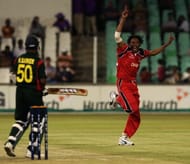
In a clash between minnows, it is usually difficult to predict a runaway winner. The logical mind would have chosen Bangladesh, given their participation at ODI cricket’s showpiece event in the previous edition, over the Canadians, who were participating in their first World Cup since 1979. Even so, a riveting contest was in store, and an upset victory was certainly not what all expected. The rookies in red, however, were determined to showcase their abilities at the biggest stage and did so with aplomb.
Early on, though, there were fears that the game would turn out to be another drab tie between two newcomers. But Ian Billcliff stood among the ruins, scoring a composed 42, with Desmond Churney (28) and opener Ishwar Maraj (24) playing the supporting roles to perfection, as Khaled Mashud’s men bundled them out for 180. In response, Bangladesh were off to a fairly solid start, crossing thirty in the sixth over itself. Then the rot set in.
Austin Codrington, backed by sharp fielding and maintaining remarkable control over his line-and-length, tormented the rival lineup mercilessly, inducing most of them into false strokes. He removed Hannan Sarkar first up, exploiting the batsman’s lack of footwork, and then took out the dangerous Alok Kapali just when the batsman was beginning to find his bearings. The dread-locked bowler then returned to dismiss the tail, thus earning the first ever five-wicket haul of his career and in the tournament, as Canada jubilantly wrapped up a thrilling victory by 60 runs.
#4 India vs West Indies, Final, 1983 World Cup
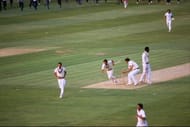
Never, ever, underestimate an underdog. They could just end up hassling you so much that you make a fatal mistake at a very crucial stage of the game. The West Indies, playing in their third consecutive final of the World Cup, should have remembered this old adage. What transpired at Lord’s on 25 June 1983 is now a glittering chapter in India’s cricketing annals – a triumph of the unheralded over the favourite.
Clive Lloyd won the toss and put Kapil Dev’s squad into bat, hoping to take advantage of the early moisture and cloudy conditions at the time. His decision looked to have been the right one as the fearsome pace battery of Marshall, Roberts, Garner and Holding delivered yet again, with the Indians managing a paltry 183 courtesy Krish Srikkanth, Sandeep Patil, Mohinder Amarnath, and the rest of the lower order. In turn, Balwinder Sandhu fired out the legendary Gordon Greenidge early, but the swaggering Viv Richards set about decimating the bowling in his cold ruthless manner. Something magical was needed if India had to make a match of it.
It came in Madan Lal’s over – Richards pulled a short delivery from outside off-stump a little too early, and the ball took the top edge as it zoomed towards the midwicket boundary. Kapil Dev, at mid-on, ran 20 yards, eyes on the red cherry, and it landed safely in his hands. The Caribbean supporters were shocked, the Indian fans jubilant. Inspired, the rest of the bowlers, with Amarnath and Binny leading the way, kept taking wickets at regular intervals, as India posted a 43-run win with the Windies crumbling to 140 all out.
#5 England vs West Indies, Final, 1979 World Cup
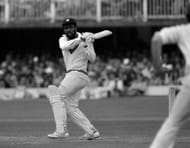
This game, too, also featured two collapses – though the second one is remembered more often than the first. Having tasted World Cup success in 1975, Clive Lloyd’s calypso kings had once again ruthlessly demolished the other sides in their run-up to the summit clash four years later. This time, their opponents were hosts England, making their maiden appearance in the ultimate encounter. Because it was the first time that a host nation had managed to secure a spot for the title round, expectations were definitely high from Mike Brearley’s team.
Initial signs were excellent – the West Indies fell to 99/4 courtesy excellent fielding and bowling from the English. However, a counter-attacking partnership between Vivian Richards and the dashing all-rounder Collis King, who outpaced his senior partner in scoring rate, enabled the defending champions to post 286 in their allotted 60 overs. England’s bowlers, notably Chris Old and Mike Hendrick, did quite well in the initial stages, although pace spearhead Bob Willis was sorely missed.
Brearley and Geoffrey Boycott managed a century stand, but used up 38 overs of the chase, thus making the asking rate a little too steep. After both fell to Michael Holding, “Big Bird” Joel Garner wrecked the line-up, dismissing five Englishmen in record time – Gooch, David Gower, Wayne Larkins and the lower order fell to his nagging pace and accurate line, and he was on a hat-trick twice – as the West Indies coasted to a 92-run win and a successful title defence.
Brand-new app in a brand-new avatar! Download CricRocket for fast cricket scores, rocket flicks, super notifications and much more! 🚀☄️
